There are so many magical beings in Spirited Away, directed by Japanese animation master, Hayao Miyazaki, that sometimes, even the creatures seen in the story scare each other. Although, don't be misled: even if it's set in a fantasy world and have an infinity of fantastic characters, the film could hardly be considered a 'children's film'. For the contrary, filled with pauses in the action and contemplative silences, this production certainly will please much more adults than the youngest audience, that might even be scared at certain points.
Written by Miyazaki himself, Spirited Away is about a little girl, Chihiro, whose parents decide to move. During their trip to their new home, the girl's family gets lost, and they end up finding a tunnel in the middle of the woods. Courious, the two adults decide to find out what's in the other side of the tunnel for Chihiro's desperation, who can feel there's something wrong in the air. Convinced that they found the ruins (very well conserved) of an abandoned theme park, Chihiro's parents are quite surprised when they see a big table filled with food, which they must taste. Refusing to share the mysterious meal, the girl walks away and finds a boy, Haku, who warns her about the danger of remaining in that place after sunset. Unfortunately, the warn is a bit too late, and Chihiro finds out that her parents have been turned into pigs and the 'theme park' is actually, a bath house frequented by gods. Now, she must adapt to that scary world and try to find, with Haku's help, some way to bring her parents back to normal.
As it can be noticed, the plot of Spirited Away is a real nightmare for children, all alone in the world, without counting on her parents, the girl gets inside a strange place inhabited by ghosts. Determined to make her journey a real terror, Miyazaki creates huge and scary scenaries, such as the long wooden stairs, that has no handrails, is miles from the ground, which makes Chihiro go step by step sitting down. It was not by chance, that during the 125 minutes of film, the one word that came to my mind the most was 'scary'.
It's not that Spirited Away doesn't have their moments of humor, but, when the laughter come, they're caused, most of the time, by a sentiment of weirdness or by relief after a more tense moment. This tendency, by the way, is mirrored by the visual of the characters themselves, that, in the other hand of most animations, have no trace of 'cute' in them, except of course, the little mouse and the bird who follow Chihiro towards the end of the film. A good example of those weird characters, the scary (ther it its, 'scary' again) Yubaba: wrinkled, with a soar voice, giant head, who owns the bath house, enters the film in a very particular and remarkable way, smoking and blowing out a thick smoke through her huge nose. But, Miyazaki also teaches a great lesson about the mistake of judging people (or in the case of this film, creatures) by how they look like, by introducing Kamajii, a character whose several arms remind a spider, but in fact, has a great heart.
With a tone clearly episodic, the script has many different challenges for her hero, what, in certain moments, compromises a bit the focus of the story: one important character, Zeniba, for example, is just introduced in the story after half way through the film, which usually is a big narrative mistake. Besides, not all 'episodes' are equally interesting: although the sight of the muddy spirit of the river (another beautiful lesson from the director) is fascinating, the same can't be said by the incidents related to another character, the 'No-Face', whose motivations are never clearly revealed, in spite of the importance of the character in the plot. Why his mood changes depending on the place he's at? And what was his destiny anyway?
Chihiro is an amazing lead role. Initially, shown as a bored child, the girl gradually becomes more mature and braver, growing (emotionally) in front of our eyes. Besides, Miyazaki's carefully detailed animation adds even more details to the personality of the character, for example, the way the girl crosses her arms and squeeze them against her body in a moment of higher anxiety, or how she leaps of distress towards their parents' stubborness. And notice, also, the subtelty in which she puts on her shoes, kicking the floor, to adjust them on her feet. Particularities such as those make the director one of the most respected on the area of animation.
Though is one bit too long, Spirited Away is one of the most interesting animations in recent years, only compared to the Pixar productions.
*It's also curious to see that just like the Pixar productions themselves, this film was also distributed by Disney in the US, whose animation department, constantly disappoints us with their most recent works. It seems that Mickey's enterprise is following the old saying: if you can't beat them, join them.
All reviews -
Movies (26)
David Lynch meets Alice in Wonderland
 Posted : 17 years, 4 months ago on 16 February 2008 06:27
(A review of Spirited Away)
Posted : 17 years, 4 months ago on 16 February 2008 06:27
(A review of Spirited Away) 0 comments, Reply to this entry
0 comments, Reply to this entry
wonderfully sad or sadly wonderful
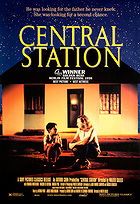 Posted : 17 years, 4 months ago on 14 February 2008 12:55
(A review of Central Station)
Posted : 17 years, 4 months ago on 14 February 2008 12:55
(A review of Central Station)I've just seen once again this wonderful Brazillian film and every time, I just can't help noticing that Central Station has one great quality: simplicity. That's absolutely relevant for a film to be classified as "great". In just a few minutes into the story, it already has our complete attention.
The film tells the story of Dora (Fernanda Montenegro, exceptional) a woman who makes a living out of writing letters for people who can't read or write. After they're written, Dora takes the letters home, and reads them with her neighbor Irene, both have fun deciding which should be sent and which should not. That's when Dora meets Josue (Vinicius de Oliveira, also exceptional), a nine year-old boy whose mother is hit by a bus and dies in front of the train station Dora works. Now, their destinies are bound to one another.
The technical aspects of the film are flawless. The photography is stunning going from the grayish aspect of the big city of Rio de Janeiro to the clear endless horizon of the roads. Together with the amazing soundtrack that matches perfectly with every moment of the film, the visual effects are enhanced.
The script tells a tough story, hard to be digested, specially for countries who are not familiarized with such poverty and difficulties. The fact that Dora sees herself, partially, in Josue's place, transfering her own frustrations towards her father, to the boy. She's a cynical person, who doesn't have faith in anyone or anything. For her, life is nothing more than one day after the other. There's no love or noble feelings in the world. Everyone that dictate her their letters have, in her eyes, something rotten or even dark. Dora lost most of her own humanity through tough and long years.
Although, during her trip with Josue, she's forced to see the world not only watch it. Small things like the generosity of a traveller who offers her a bit of his already simple meal or the kindness of a truck driver that can penetrate through her shield. And, besides the fact that Josue desperately needs her, even if it is for a small period of time. Maybe the boy is the first person ever that depends completely of Dora in all her life up to that point, and amazingly (even for her), she seems to like being responsable for someone. Not initially of course, but as the story develops.
Fernanda Montenegro has such an absolute acting in this film. Her character's learning is transmited to the spectators in such an intelligent way that we can't celebrate to each new victory, to each small change in her initially bitter personality, we grow up with Dora. But there's more beaituful acting in the film not only Fernanda's (who tottaly deserved her Oscar nomination, by the way). Irene is a character that is curiously naïve in between all the chaos and bitterness, and the truck driver, who manages, during so little time on screen, leave a deep impression in the audience, thanks to his charisma and his kindness. Last but not least, there's Josue, with a brilliant work, his talent is huge, one example is a scene where he sees a man who he thinks is his long lost father, he swallows, loses his breath and, imperceptively, attaches to the wall in a mix of expectation and excitement. Those small details are a treat and make a great actor's performance.
Walter Salles does one great work here. His directing is sincere and skilled on showing an ugly and poor side of Brazil but that's rich in feelings - which can be transfered to any other country that lives the same realities. The faces marked by a difficult life that write the letters in the story are a living portrate of a country that allows his people to suffer, but that can't stop those same people to express deeply their passions or that suffers from its misfortunes. And that, by itself, is a wonderful message.
*Liberty taken in this last paragraph, because this film has connections in many levels with the best of the Iranian cinema, showing the hard life of their simple people.
The film tells the story of Dora (Fernanda Montenegro, exceptional) a woman who makes a living out of writing letters for people who can't read or write. After they're written, Dora takes the letters home, and reads them with her neighbor Irene, both have fun deciding which should be sent and which should not. That's when Dora meets Josue (Vinicius de Oliveira, also exceptional), a nine year-old boy whose mother is hit by a bus and dies in front of the train station Dora works. Now, their destinies are bound to one another.
The technical aspects of the film are flawless. The photography is stunning going from the grayish aspect of the big city of Rio de Janeiro to the clear endless horizon of the roads. Together with the amazing soundtrack that matches perfectly with every moment of the film, the visual effects are enhanced.
The script tells a tough story, hard to be digested, specially for countries who are not familiarized with such poverty and difficulties. The fact that Dora sees herself, partially, in Josue's place, transfering her own frustrations towards her father, to the boy. She's a cynical person, who doesn't have faith in anyone or anything. For her, life is nothing more than one day after the other. There's no love or noble feelings in the world. Everyone that dictate her their letters have, in her eyes, something rotten or even dark. Dora lost most of her own humanity through tough and long years.
Although, during her trip with Josue, she's forced to see the world not only watch it. Small things like the generosity of a traveller who offers her a bit of his already simple meal or the kindness of a truck driver that can penetrate through her shield. And, besides the fact that Josue desperately needs her, even if it is for a small period of time. Maybe the boy is the first person ever that depends completely of Dora in all her life up to that point, and amazingly (even for her), she seems to like being responsable for someone. Not initially of course, but as the story develops.
Fernanda Montenegro has such an absolute acting in this film. Her character's learning is transmited to the spectators in such an intelligent way that we can't celebrate to each new victory, to each small change in her initially bitter personality, we grow up with Dora. But there's more beaituful acting in the film not only Fernanda's (who tottaly deserved her Oscar nomination, by the way). Irene is a character that is curiously naïve in between all the chaos and bitterness, and the truck driver, who manages, during so little time on screen, leave a deep impression in the audience, thanks to his charisma and his kindness. Last but not least, there's Josue, with a brilliant work, his talent is huge, one example is a scene where he sees a man who he thinks is his long lost father, he swallows, loses his breath and, imperceptively, attaches to the wall in a mix of expectation and excitement. Those small details are a treat and make a great actor's performance.
Walter Salles does one great work here. His directing is sincere and skilled on showing an ugly and poor side of Brazil but that's rich in feelings - which can be transfered to any other country that lives the same realities. The faces marked by a difficult life that write the letters in the story are a living portrate of a country that allows his people to suffer, but that can't stop those same people to express deeply their passions or that suffers from its misfortunes. And that, by itself, is a wonderful message.
*Liberty taken in this last paragraph, because this film has connections in many levels with the best of the Iranian cinema, showing the hard life of their simple people.
 0 comments, Reply to this entry
0 comments, Reply to this entry
typical yet satisfying
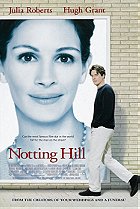 Posted : 17 years, 4 months ago on 10 February 2008 01:27
(A review of Notting Hill)
Posted : 17 years, 4 months ago on 10 February 2008 01:27
(A review of Notting Hill)Anna is a famous actress who makes (concidentially or not) 15 million dollars a film. Always surrounded by nosy reporters, she goes to London to promote her most recent film. One day, she goes to Notting Hill and enters in a bookstore owned by William (Hugh Grant) a man who had just gone through a divorce and whose room mate is a Welsh who apparentely, makes a living doing strange performances on the city streets. Although he recognized immeadetely the actress, William, with typical British discretion, behaves like she's just another costumer, which pleases her a lot. Moments later, the two meet again when he, by chance, spills orange juice on the clothes of the star and convinces her to go to his apartment to change clothes. From then on, begins a complicated romance, as they both live in completely different realities.
Clichés, clichés, clichés. Notting Hill is full of them, from the 'convenient' second encounter of the two (is there anything more common-ground than the old scene where thr good guy spills something on the clothes of the good girl?) to the scene where the film ends (again, I won't spoil it). But the fact is that those things doesn't bother at all. Actually, this is one of those stories that everyone knows how it is going to end, but it's fun to see how things are going to get there.
The script, written by Richard Curtis, reuses a lot of the elements of another of his work, Four Weddings and a Funeral. All of Hugh Grant's strange friends are there, and that's not all, Curtis also seems to reuse whole scenes, like the one which all squeeze inside a car and another one that William gets all his friends together to give advices to one another. Still, this 'lack of originality' doesn't bother either, the film can get good laughs.
Hugh Grant, as the insecure bookstore owner does the same job that he did on 'Four Weddings'. But let's be fair, the actor is equally fun and captivating in his so very typical British way. And his chemistry with Julia Roberts is essential for the film to work, we (the spectators) really hope that they end up together. And also Rhys Ifans, who plays the repulsive yet funny room mate Spike, has many of the best moments of the story.
Roger Michell's direction, is quite irregular though, becoming unbearably slow and predictable in some occasions. A great example is the scene where William loses his glasses just before going to the cinema with Anna. When he's leaving, Spike asks him if he found them, and he answers "kind of". Next, the camera slides through the interior of the theater for way too long, giving us enough time to predict the upcoming joke. On the other hand, there's a wonderful sequence where William walks through the streets of Notting Hill as we see time going by: fall, winter, spring and summer. The most incredible is that Michell does that in practically one cut.
The soundtrack is hand picked, giving the proper pace to the film, either it is a happy or a sad moment.
The fact is that this romantic comedy does its deed, the main couple has a beautiful, funny, difficult and believable love story, as laughs are strategically placed throughout the plot. For a film whose flaws and virtues are simply balanced, the final result is above average.
Clichés, clichés, clichés. Notting Hill is full of them, from the 'convenient' second encounter of the two (is there anything more common-ground than the old scene where thr good guy spills something on the clothes of the good girl?) to the scene where the film ends (again, I won't spoil it). But the fact is that those things doesn't bother at all. Actually, this is one of those stories that everyone knows how it is going to end, but it's fun to see how things are going to get there.
The script, written by Richard Curtis, reuses a lot of the elements of another of his work, Four Weddings and a Funeral. All of Hugh Grant's strange friends are there, and that's not all, Curtis also seems to reuse whole scenes, like the one which all squeeze inside a car and another one that William gets all his friends together to give advices to one another. Still, this 'lack of originality' doesn't bother either, the film can get good laughs.
Hugh Grant, as the insecure bookstore owner does the same job that he did on 'Four Weddings'. But let's be fair, the actor is equally fun and captivating in his so very typical British way. And his chemistry with Julia Roberts is essential for the film to work, we (the spectators) really hope that they end up together. And also Rhys Ifans, who plays the repulsive yet funny room mate Spike, has many of the best moments of the story.
Roger Michell's direction, is quite irregular though, becoming unbearably slow and predictable in some occasions. A great example is the scene where William loses his glasses just before going to the cinema with Anna. When he's leaving, Spike asks him if he found them, and he answers "kind of". Next, the camera slides through the interior of the theater for way too long, giving us enough time to predict the upcoming joke. On the other hand, there's a wonderful sequence where William walks through the streets of Notting Hill as we see time going by: fall, winter, spring and summer. The most incredible is that Michell does that in practically one cut.
The soundtrack is hand picked, giving the proper pace to the film, either it is a happy or a sad moment.
The fact is that this romantic comedy does its deed, the main couple has a beautiful, funny, difficult and believable love story, as laughs are strategically placed throughout the plot. For a film whose flaws and virtues are simply balanced, the final result is above average.
 0 comments, Reply to this entry
0 comments, Reply to this entry
Anything but usual
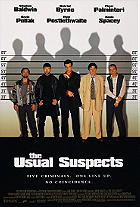 Posted : 17 years, 4 months ago on 9 February 2008 01:17
(A review of The Usual Suspects)
Posted : 17 years, 4 months ago on 9 February 2008 01:17
(A review of The Usual Suspects)One of my personal favorites of all times. Maybe not THE best film ever. But one of those few films that everyone should see at least twice.
Everything about this film is great. Great acting, great script, great directing, not to mention the unforgettable ending. It's hard to believe that is the same director of Superman Returns (I'll get to that some day).
All actors (yes, ALL) fit perfectly in their characters, from the main parts to the smaller ones.
Gabriel Byrne as Dean Keaton is convincing as the ex-con trying to build a new life when he gets drawn back into his old life. Stephen Baldwin as Michael McManus is the smart-mouthed and cocky professional criminal. Kevin Pollak takes a big departure from his usual good comedy self to take a more dramatic role.
But the best of the film are Benicio del Toro, who literally takes a one-dimensional character with absolutely nothing in the script to give him character and he fleshes it out with brilliant mannerisms and memorable mumbling to show incredible acting creativity and Kevin Spacey who was simply born to be in this movie. His manners and fast-talking yet shy gimp nature are a treat to listen to throughout the film.
Without giving away much of the plot, the best and most genius parts of the movie are the subtleties. After you see the ending (I won't spoil) and the truth hits you like a ton of bricks, you have to watch it again. On a second time through, you'll jump up and point at the screen whenever a clue missed the first time is spotted.
It's even possible to watch the movie many times and see something new every time around. It's that attention to detail that make the deceptively innocent-looking Usual Suspects one of the greatest movies of all time.
And I'd like to recognize too the work of John Ottman, the composer of the soundtrack, it matches the action, the suspense and the acting, what makes the film even more delightful to watch.
Everything about this film is great. Great acting, great script, great directing, not to mention the unforgettable ending. It's hard to believe that is the same director of Superman Returns (I'll get to that some day).
All actors (yes, ALL) fit perfectly in their characters, from the main parts to the smaller ones.
Gabriel Byrne as Dean Keaton is convincing as the ex-con trying to build a new life when he gets drawn back into his old life. Stephen Baldwin as Michael McManus is the smart-mouthed and cocky professional criminal. Kevin Pollak takes a big departure from his usual good comedy self to take a more dramatic role.
But the best of the film are Benicio del Toro, who literally takes a one-dimensional character with absolutely nothing in the script to give him character and he fleshes it out with brilliant mannerisms and memorable mumbling to show incredible acting creativity and Kevin Spacey who was simply born to be in this movie. His manners and fast-talking yet shy gimp nature are a treat to listen to throughout the film.
Without giving away much of the plot, the best and most genius parts of the movie are the subtleties. After you see the ending (I won't spoil) and the truth hits you like a ton of bricks, you have to watch it again. On a second time through, you'll jump up and point at the screen whenever a clue missed the first time is spotted.
It's even possible to watch the movie many times and see something new every time around. It's that attention to detail that make the deceptively innocent-looking Usual Suspects one of the greatest movies of all time.
And I'd like to recognize too the work of John Ottman, the composer of the soundtrack, it matches the action, the suspense and the acting, what makes the film even more delightful to watch.
 0 comments, Reply to this entry
0 comments, Reply to this entry
Woody's black and white Manhattan
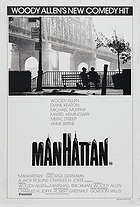 Posted : 17 years, 4 months ago on 31 January 2008 03:24
(A review of Manhattan (1979))
Posted : 17 years, 4 months ago on 31 January 2008 03:24
(A review of Manhattan (1979))So much about this film was said since it's release in 1979, that I feel that I won't say anything new here. But I'm going to write something about it anyways, because I love this film.
Isaac Davis (Woody Allen) is a divorced writer of TV shows unhappy with his job. His ex-wife, Jill (Meryl Streep) left him to live with another woman and is writing a book about her relationship with him. He dates a seventeen year-old high-school student, Tracy (Mariel Hemingway), who is in love with him, but he doesn't feel the same for her. When he meets Mary Wilkie (Diane Keaton), the mistress of his married best friend Yale (Michael Murphy), he instantaneously has a crush on her.
This is without any space for doubt, Woody Allen's best. Manhattan has brilliant insights into human nature, the black and white photography is visually breathtaking.
Its realistic dialogue and probing commentary on the desperate nature of men and women in search of love makes this film one of a kind.
And, though I might not approve of Isaac's final choice (don't worry, I won't tell), his almost religious experience which brings him to that conclusion is a stunning climax, wheather or not he changes his mind about what is right for him at that point.
Isaac Davis (Woody Allen) is a divorced writer of TV shows unhappy with his job. His ex-wife, Jill (Meryl Streep) left him to live with another woman and is writing a book about her relationship with him. He dates a seventeen year-old high-school student, Tracy (Mariel Hemingway), who is in love with him, but he doesn't feel the same for her. When he meets Mary Wilkie (Diane Keaton), the mistress of his married best friend Yale (Michael Murphy), he instantaneously has a crush on her.
This is without any space for doubt, Woody Allen's best. Manhattan has brilliant insights into human nature, the black and white photography is visually breathtaking.
Its realistic dialogue and probing commentary on the desperate nature of men and women in search of love makes this film one of a kind.
And, though I might not approve of Isaac's final choice (don't worry, I won't tell), his almost religious experience which brings him to that conclusion is a stunning climax, wheather or not he changes his mind about what is right for him at that point.
 0 comments, Reply to this entry
0 comments, Reply to this entry
A lovely film
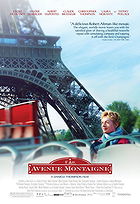 Posted : 17 years, 4 months ago on 30 January 2008 02:08
(A review of Avenue Montaigne)
Posted : 17 years, 4 months ago on 30 January 2008 02:08
(A review of Avenue Montaigne)Written by Daniele Thomson and her son Christopher, Fauteuils d'Orchestre or "Orchestra Seats" translating to the meaning of the words, is a film with many reasons to love.
A wonderful story and put it under the Paris sky and wonderful sites of the city, each person in this movie has a something that we all can relate with. The comedy portion has lots of heartfelt sentiment.
Catherine, hugely popular (and becoming very wealthy) from her television soap opera, longs for more meaningful and prestigious work. She prepares to star in a Feydeau farce about to open. Jean-François, a piano virtuoso with an international reputation, is preparing for a major Beethoven recital but he's becoming exhausted and disenchanted with the elitism of his milieu. Jacques, an art expert, has gathered an extraordinary and highly personal collection, but it will all be sold off. Catherine, Jean-François and Jacques go to a café where Jessica, a charming girl who recently arrived in Paris from the countryside, witness all those stories upclose.
All the acting is superb, the Effel Tower with the flashing lights is very romantic and fits perfectly with the mood of the film. Jessica (Cécile De France), the main character is so believable and is on the right path to be a great star in a near future.
It is so good to see a great film which its only concern is to make the expectator feel good. There's not one signal of violence in this film, what makes it even more enjoyable to watch.
A wonderful story and put it under the Paris sky and wonderful sites of the city, each person in this movie has a something that we all can relate with. The comedy portion has lots of heartfelt sentiment.
Catherine, hugely popular (and becoming very wealthy) from her television soap opera, longs for more meaningful and prestigious work. She prepares to star in a Feydeau farce about to open. Jean-François, a piano virtuoso with an international reputation, is preparing for a major Beethoven recital but he's becoming exhausted and disenchanted with the elitism of his milieu. Jacques, an art expert, has gathered an extraordinary and highly personal collection, but it will all be sold off. Catherine, Jean-François and Jacques go to a café where Jessica, a charming girl who recently arrived in Paris from the countryside, witness all those stories upclose.
All the acting is superb, the Effel Tower with the flashing lights is very romantic and fits perfectly with the mood of the film. Jessica (Cécile De France), the main character is so believable and is on the right path to be a great star in a near future.
It is so good to see a great film which its only concern is to make the expectator feel good. There's not one signal of violence in this film, what makes it even more enjoyable to watch.
 0 comments, Reply to this entry
0 comments, Reply to this entry
Will and Jayden shine
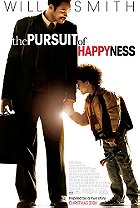 Posted : 17 years, 4 months ago on 29 January 2008 03:26
(A review of The Pursuit of Happyness)
Posted : 17 years, 4 months ago on 29 January 2008 03:26
(A review of The Pursuit of Happyness)One of the best films of 2007, and with high expectation in the Oscars one year ago, The Pursuit of Happyness is a film that essentially exalts the model: America - Land of Opportunities, but is a great film nevertheless, with remarkable acting by real life father and son Will and Jayden Smith.
Based on the true story of Chris Gardner, who in the early 1980's, faced many difficulties, because of an investiment on an expensive and almost useless medical device, it takes him into a spiral of misfortune from being abandoned together with his young son, by his wife, to having to sleep on shelters at night. But in spite of all, Chris must not lose hope for his son.
In the hands of a less talented director, the film could be turned into a cheap melodrama, but Muccino does his job very well holding the story when its needed to be held, not to fall in a cliche valley of tears.
Will Smith also does his job as Chris, portraying a character completely different from what we're used to see him in. With real life dramas, such as finding a place for his son to sleep, instead of shooting this or that alien that blew up a government building.
Jayden Smith steals all scenes that he's in, with a charisma as big as both his parents' (Jada Pinkett-Smith is his real life mother) his naturality is amazing, far away from those "genius kids" who look more like small adults saying fake lines all the time.
But the film slips. In portraying Chris' ex-wife as a cold hearted woman who gave up her husband and her son without much of a fight and on the ammount of "convenient coincidences", such as allowing Chris to see (three times) in a big city, the very same people who stole from him earlier.
But still The Pursuit of Happyness is an entretaining film with a nice message, and most important of all, it's not corny.
Based on the true story of Chris Gardner, who in the early 1980's, faced many difficulties, because of an investiment on an expensive and almost useless medical device, it takes him into a spiral of misfortune from being abandoned together with his young son, by his wife, to having to sleep on shelters at night. But in spite of all, Chris must not lose hope for his son.
In the hands of a less talented director, the film could be turned into a cheap melodrama, but Muccino does his job very well holding the story when its needed to be held, not to fall in a cliche valley of tears.
Will Smith also does his job as Chris, portraying a character completely different from what we're used to see him in. With real life dramas, such as finding a place for his son to sleep, instead of shooting this or that alien that blew up a government building.
Jayden Smith steals all scenes that he's in, with a charisma as big as both his parents' (Jada Pinkett-Smith is his real life mother) his naturality is amazing, far away from those "genius kids" who look more like small adults saying fake lines all the time.
But the film slips. In portraying Chris' ex-wife as a cold hearted woman who gave up her husband and her son without much of a fight and on the ammount of "convenient coincidences", such as allowing Chris to see (three times) in a big city, the very same people who stole from him earlier.
But still The Pursuit of Happyness is an entretaining film with a nice message, and most important of all, it's not corny.
 0 comments, Reply to this entry
0 comments, Reply to this entry
Heeeeeere's Johnny!
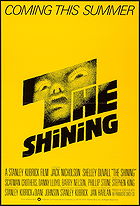 Posted : 17 years, 4 months ago on 28 January 2008 03:07
(A review of The Shining)
Posted : 17 years, 4 months ago on 28 January 2008 03:07
(A review of The Shining)Kubrick at his finest, Nicholson at his finest. What else could anyone want? This version of Stephen King's book has almost nothing to do with it. And that's one of the best things about the film.
In 1997 King did a remake with many more elements of the book, and the film is a sleeper. I had to watch it like four different times to get through it.
Anyway, I'm not here today to write about the 1997 version, but Kubrick's version. Which is much more worthy.
The story is about Jack Torrence (Jack Nicholson) an unemployed writer who gets a temporary job as the caretaker of a summer-time hotel, during the winter. All alone up there with his wife, Wendy (Shelly Duvall) and his son, Danny (Danny Lloyd) as time goes by the father begins going crazy because of the solitude and also that he can't work on his book.
Kubrick with his masterful direction makes everything about the Overlook Hotel scary, even when Wendy and Danny are playing in the garden, shortly before the snow falls.
One little thing that bothers me is that the film answers a question that I feel could remain without an answer: Are the ghosts that Jack sees all over the hotel real or not?
But this doesn't compromise at all the film. It is supposed to be scary and it is. Kubrick-like scary, what makes it so much better.
In 1997 King did a remake with many more elements of the book, and the film is a sleeper. I had to watch it like four different times to get through it.
Anyway, I'm not here today to write about the 1997 version, but Kubrick's version. Which is much more worthy.
The story is about Jack Torrence (Jack Nicholson) an unemployed writer who gets a temporary job as the caretaker of a summer-time hotel, during the winter. All alone up there with his wife, Wendy (Shelly Duvall) and his son, Danny (Danny Lloyd) as time goes by the father begins going crazy because of the solitude and also that he can't work on his book.
Kubrick with his masterful direction makes everything about the Overlook Hotel scary, even when Wendy and Danny are playing in the garden, shortly before the snow falls.
One little thing that bothers me is that the film answers a question that I feel could remain without an answer: Are the ghosts that Jack sees all over the hotel real or not?
But this doesn't compromise at all the film. It is supposed to be scary and it is. Kubrick-like scary, what makes it so much better.
 0 comments, Reply to this entry
0 comments, Reply to this entry
Scorsese's Unknown Comedy
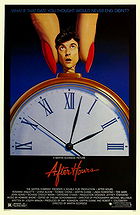 Posted : 17 years, 4 months ago on 27 January 2008 02:54
(A review of After Hours)
Posted : 17 years, 4 months ago on 27 January 2008 02:54
(A review of After Hours)One of Martin Scorsese's best films is almost completely unknown even by some of his fans who like his most famous films such as Taxi Driver, Raging Bull, Casino, Goodfellas, etc. After Hours is a comedy, but in the Scorsese style, really dark, nightmarish, but still a very enjoyable film to watch even more than once.
Griffin Dunne, perfect, is the shy and nerdy Paul Hackett a computer expert, who meets Marcy (Rosanna Arquette) by chance in a restaurant. After some conversation, they agree on meeting later that night. That's when things begin to go ridiculously wrong for him.
During a few hours, Paul witness suicide, murder, robbery, bandits and the most bizarre gallery of characters in the New York night.
Great direction and great acting both from the main characters and the cameos, make this film very original and a must see for anyone with the smallest sympathy for the Scorsese films.
Griffin Dunne, perfect, is the shy and nerdy Paul Hackett a computer expert, who meets Marcy (Rosanna Arquette) by chance in a restaurant. After some conversation, they agree on meeting later that night. That's when things begin to go ridiculously wrong for him.
During a few hours, Paul witness suicide, murder, robbery, bandits and the most bizarre gallery of characters in the New York night.
Great direction and great acting both from the main characters and the cameos, make this film very original and a must see for anyone with the smallest sympathy for the Scorsese films.
 0 comments, Reply to this entry
0 comments, Reply to this entry
The Nanny Diaries
 Posted : 17 years, 4 months ago on 25 January 2008 11:44
(A review of The Nanny Diaries)
Posted : 17 years, 4 months ago on 25 January 2008 11:44
(A review of The Nanny Diaries)I must confess, I expected a lot from this film. The directors Shari Springer Berman and Robert Pulcini had previously made American Splendor, a very original film that was a great surprise to me. Having this in mind plus the help of Scarlett Johansson in the main role elevated my expactations towards The Nanny Diaries.
Don't get me wrong, the film has its moments, and they're not rare.
Scarlett is great as always, as Annie Braddock a young woman who had just graduated from college and has no idea what to do with her life from now on. Like magic, a "temporary" job appears in front of her after she knows Grayer and his mom, Mrs. X (a very original move by the script naming her like that) played by the also very talented Laura Linney, who's the typical Upper East Side rich woman. Now Annie has an income untill she decides what to do for real in her life.
The narration done by Annie during the entire film is very well placed, and it doesn't sound unnecessary at any moment, instead it makes everyday situations faced by the nannys of rich women, comic.
The main problem I had with The Nanny Diaries, is Annie's romance with her boss' neighbor, played by Chris Evans (best known as the Human Torch in the Fantastic Four films) which sounds completely out of tune with the rest of the film.
The main parts of the film are very well portrayed. Annie has a bit of ingenuity and somewhat of a critical eye towards certain situations, which doesn't sound fake. Mrs. X ultimately makes us feel compassion for her, something quite difficult to achieve towards a rich and futile woman. The kid (Nicholas Art) is very well and also doesn't sound forced at any moment. And finally the father, Mr. X (Paul Giamatti) is very well as the distant father who works, works and works just to be far from his family.
The only problem is Chris Evans and his character, who is really futile and selfish, what makes me think: Annie with all her wits and common sense, how did she not saw her boyfriend's personality from the start?
Don't get me wrong, the film has its moments, and they're not rare.
Scarlett is great as always, as Annie Braddock a young woman who had just graduated from college and has no idea what to do with her life from now on. Like magic, a "temporary" job appears in front of her after she knows Grayer and his mom, Mrs. X (a very original move by the script naming her like that) played by the also very talented Laura Linney, who's the typical Upper East Side rich woman. Now Annie has an income untill she decides what to do for real in her life.
The narration done by Annie during the entire film is very well placed, and it doesn't sound unnecessary at any moment, instead it makes everyday situations faced by the nannys of rich women, comic.
The main problem I had with The Nanny Diaries, is Annie's romance with her boss' neighbor, played by Chris Evans (best known as the Human Torch in the Fantastic Four films) which sounds completely out of tune with the rest of the film.
The main parts of the film are very well portrayed. Annie has a bit of ingenuity and somewhat of a critical eye towards certain situations, which doesn't sound fake. Mrs. X ultimately makes us feel compassion for her, something quite difficult to achieve towards a rich and futile woman. The kid (Nicholas Art) is very well and also doesn't sound forced at any moment. And finally the father, Mr. X (Paul Giamatti) is very well as the distant father who works, works and works just to be far from his family.
The only problem is Chris Evans and his character, who is really futile and selfish, what makes me think: Annie with all her wits and common sense, how did she not saw her boyfriend's personality from the start?
 0 comments, Reply to this entry
0 comments, Reply to this entry
 Login
Login
 Home
Home 79 Lists
79 Lists 26 Reviews
26 Reviews Collections
Collections